|
20-22 (13) Church Street
Dover
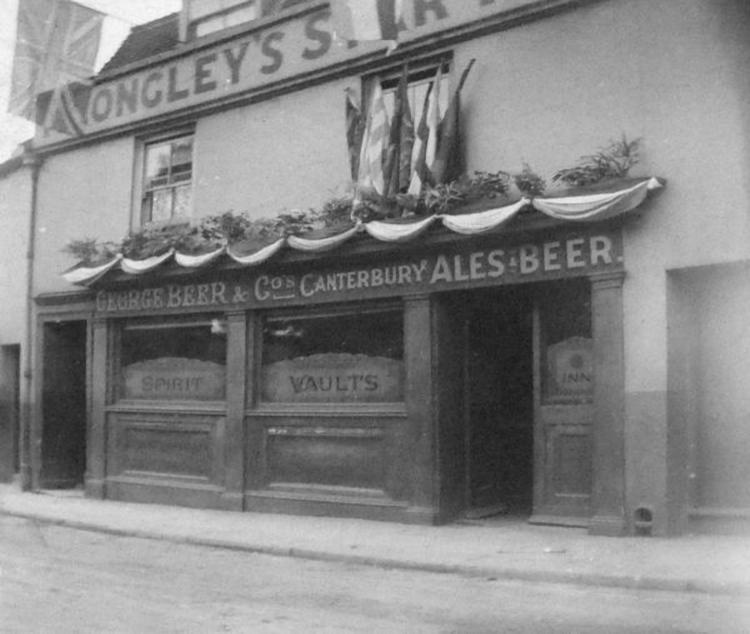
Above photo circa 1900, kindly sent by Paul Wells. |
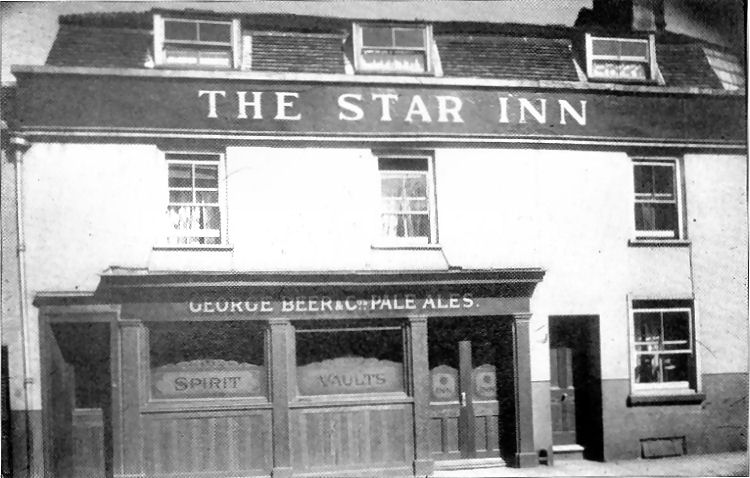
Above photo date 1927. Kindly supplied by Kevin Healey. |
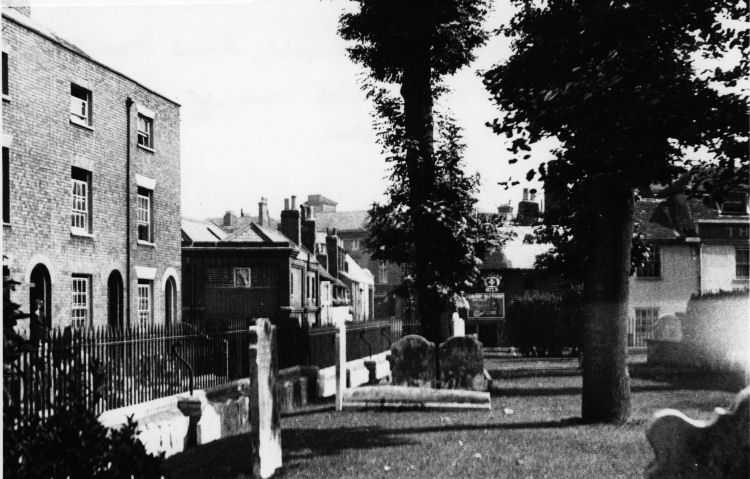 |
|
Part of the Star shown on the right of this photo, pre 1944. |
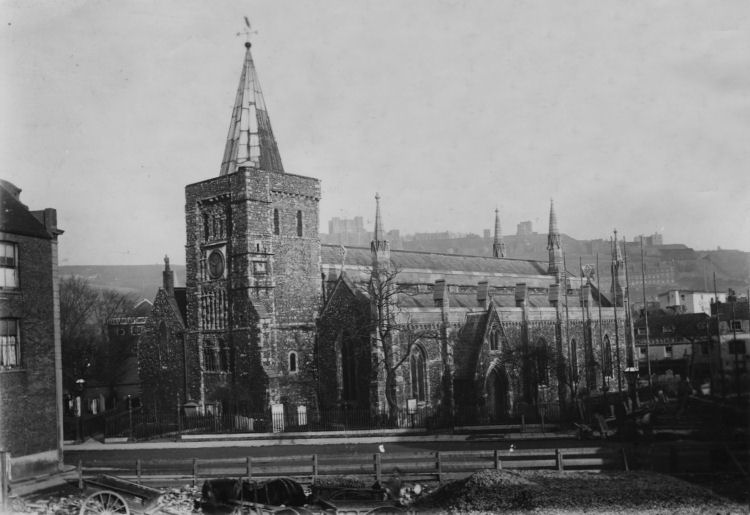 |
|
Above shows St Mary's Church with Pickfords on the left of the church
and the Star on the right.
Below is a close-up view of the Star circa
1900. |
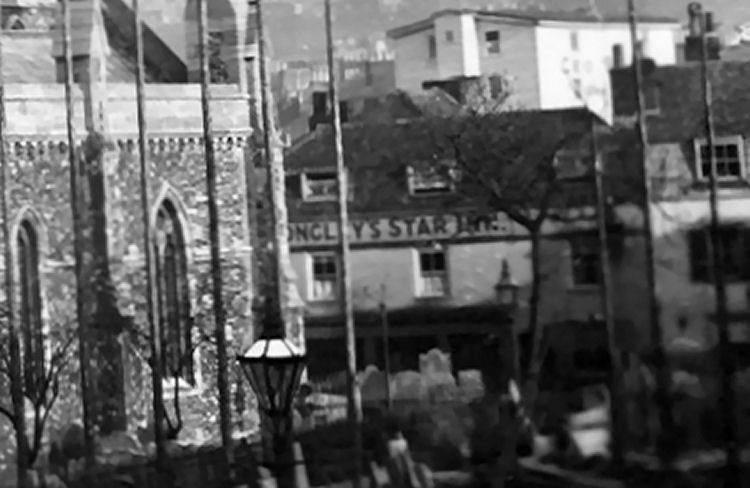
Above photo circa 1900. |
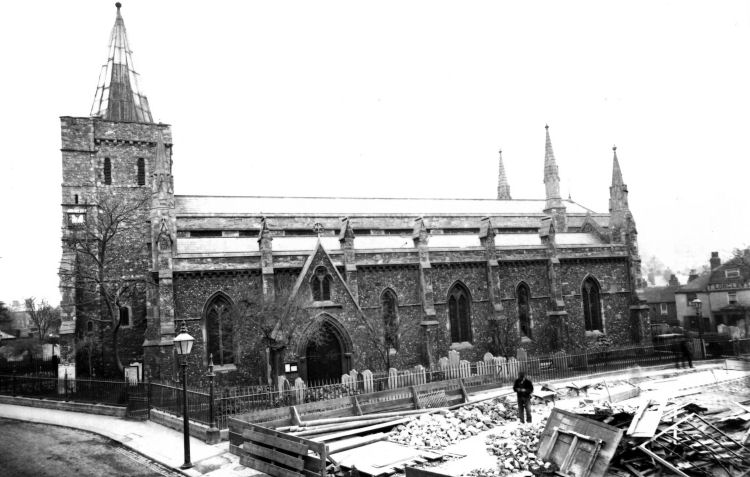
A similar shot, kindly supplied by Kathleen Hollingsbee, saying circa
1910. |
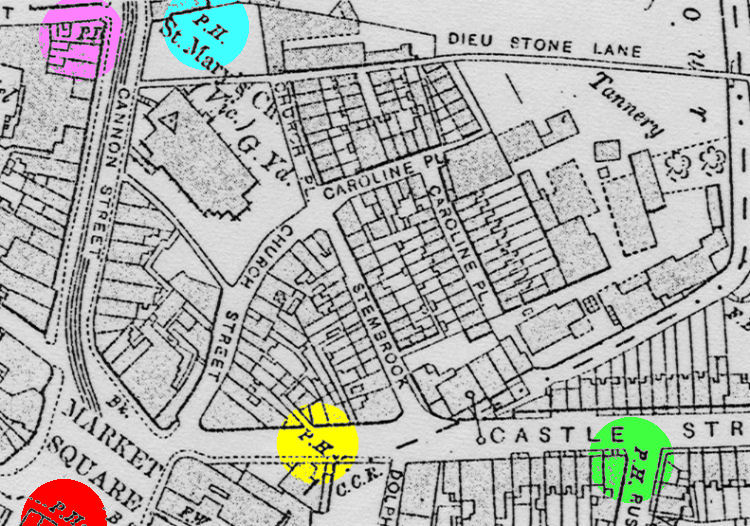
Church Place, left, then Stembrook, behind street turning to right (shop on corner) and the corner of
The Star Public House (highlighted in yellow). Home of Thomas Longley. By kind permission of Dover Library ILL/2757.
(Pink=Rose, Blue=Wellington,
Red=Fountain, Green=Castle.) |
It was number 13 in the last century but the site is the same. There was
a street widening in the past but the necessary ground was purloined from
the church yard on the opposite side. Mrs. Fry present in 1841 and at that
time it was always described as an inn.
|
From the Kentish Gazette, 14 October 1845.
DOVER.
A Coroner's Inquest was held on Tuesday evening at the "Star Inn,"
Church Street, before G. T. Thompson, Esq., Coroner for the Borough, on
the body of James Sinden, aged 18, who committed suicide by hanging
himself. The Jury after an absence of about twenty minutes returned a
verdict "That deceased hanged himself, being at the time of unsound
mind," observing they were of opinion that there was no evidence to
impugn the conduct of his master, Mr. Finch.
|
|
From the Dover Telegraph, 21 March, 1846 p.8 c.3
FRY Edward, Innkeeper - Creditor of Bankrupt PARKINSON (dentist) late
of Dover.
|
|
From the Dover Telegraph and Cinque Ports General Advertiser, Saturday, 11 October, 1845. Price 5d.
ANOTHER MELONCHOLY SUICIDE AT DOVER
A Coroner's Inquest was held on Tuesday evening at the “Star Inn,”
Church Street, before G. T. Thompson, Esq., Coroner for the Borough, on
the body of James Sinden, aged 18, who committed suicide by hanging
himself. The Jury having appointed Mr. C. Corbett foreman, they
proceeded to view the body, and on their return the following evidence
was adduced:-
Austin Finch, baker, Church Street, deposed: Deceased was an apprentice
in my employ. This morning, at half past six, having occasion to go into
the storehouse, I saw, standing on the copper, a glass tumbler and coat
and cap, lying on a tub. Thinking, as deceased had not come home in time
the previous evening, he had gone into the loft to sleep, I went up to
call him, when I saw him hanging from the rafters. I immediately cut him
down. He was quite cold. I saw him alive about 7 o'clock last evening in
the bake-house. He finished his work and went into the house. He was at
times of rather a sullen disposition, but I observed nothing particular
in his manner yesterday. About half past ten last evening, finding he
did not come home as usual, I became anxious and thinking he might have
gone down to his brother, I went to the “London Hotel.” His brother told
me he met him about half past eight near the Post Office, when he said
it was near his time to go home and left me. I know of nothing to
oppress his mind. He was very regular at coming home at night. I sent
him to lock the storehouse door about 7 o'clock; he took the key and
afterwards hung it in its usual place. He could not get into the
storehouse if the door was locked. It was unlocked when I went to open
it this morning. In reply to Mr. G. Halsell, a relative of deceased, who
was present to watch the proceedings on behalf of the family, witness
further deposed – I have never had occasion to strike deceased. I mildly
reproved him on Sunday evening for being half an hour beyond his time.
Susannah Burkitt, wife of Thomas Burkitt, deposed: I reside at the back
of Mr. Finch's storehouse. Last evening, about a quarter past nine, I
heard some one go towards the bake-house. I called out, “Who is there?”
Deceased replied, “If you must know, it is James.” I asked what was the
matter, and he replied he could not tell me. He was in our house about
six o'clock, when he appeared very dull. He asked me for a piece of
black thread, which I gave him. After he left me I heard him go to the
bake-house, and then turn to the storehouse. I never heard him complain
of ill-treatment, and he always spoke well of his master and mistress.
Richard Sinden, waiter at the “London Hotel,” brother of deceased,
deposed: Last evening, at half-past eight, I met deceased near Mr. Bright's shop. He walked with me to the Post office, where he put in two
letters. He then proceeded with me as far as the “Paris Hotel,” when he
left me, saying he must return, as his master wished to go to bed. He
said, as we were walking, “I have the watch of our brother, who lately
died, which I wish you to have at my death.” He appeared rather low
spirited, but nothing very unusual. He never complained to me of his
master or mistress.
Amelia Whorwell deposed: I reside with my brother-in-law, Mr. Finch.
Last evening, between seven and eight o'clock, I saw deceased writing
letters. When I went into the room he held his hand over them. He shut
up the shop at half-past eight, when I saw him put two letters in his
pocket, and leave the house. He appeared rather dull, but nothing very
unusual. One day last week he appeared very dull, and I asked him what
was the matter. He replied that he had something very heavy on his mind.
I asked if he had fell out with his young lady, but he made no reply.
Maria Pettit deposed: I am in service at Mr. Blackman's. I know
deceased. I saw him at the door on Monday evening, about 10 minutes
before nine o'clock. He gave me a brooch, and promised me some of his
hair to put in it, which he wished me to keep in remembrance of him. He
said he thought his master would have murdered him on Sunday evening. I
was then called in b y my mistress, and bade him good night. This
morning (Tuesday) I received a letter from him, by post. I gave it to my
fellow servant, who took it to Mr. Finch. He has not complained of his
master on other occasions, except that he made him be home by nine
o'clock, which was not pleasant.
Richard Sherwood, porter at Goodwin's “Pier Hotel,” deposed: last
evening about 9 o'clock, as I was standing near Mr. Bight's shop,
talking to a young woman, deceased came up to me, and squeezed her hand
very hard. The young woman's name was Simpson, and is cousin to
deceased. He asked me to take something to drink, but I refused. He then
said I must, and went across to the Temperance Hotel. I said we could
get nothing there, and we went to the “True Briton” where we had two
small glasses of gin. I asked him what made him so dull, and he said,
when we went home at 7 o'clock on Sunday evening, his master desired him
to be home by nine to fetch the supper beer, but he did not return till
twenty minutes past, when he fetched the beer, and then went into the
kitchen. His master came in two minutes, and he said he thought he would
have murdered him. I said if he was not comfortable he had better write
to his friends. He said he had done so that evening. I tried to get out
of him what his master said, but he would not tell me. I then shook
hands with him, and we parted at the corner of Bench Street.
Thomas Hobday, landlord of the “Ancient Druids,” public-house, deposed:
Last evening about nine o'clock, deceased came into my house, and asked
for six-penny-worth of the best brandy. He wished me to lend him a small
tumbler to take it away, and asked how much it would be if he broke it,
I said 3d. he then paid me for the tumbler and brandy, which he took
away.
David Hastings deposed: On Monday evening about half-past eight o'clock,
deceased came into Mr. Mummery's shop in Snargate Street, and asked for
three yards of cord. I first shewed him a piece which he said was not
strong enough for the job he wanted it for. He also bought a small
painter's brush, asking if it would stand grease without the hair coming
out. The deceased appeared to be excited, and I asked him what was the
matter, he replied, there was nothing the matter. The rope was then
produced and identified as similar to that bought. It was greased over.
This being the whole of the evidence, the Coroner read the following
letters, written by deceased, and forwarded by post on Tuesday evening:-
Dear Father and Mother, - I now feel great pleasure in writing a few
lines to you, as I shall never see you again, for I am so unhappy, so
miserable, that I cannot put up with master's nonsense any longer. I
have stood it as long as I can, so I hope you will not fret about it. I
am quite broken-hearted. I should very much like to see you once more,
but my time is come, and I must go; but I have one thing to tell you,
and that is – I should very much like Richard to have my watch, it is my
greatest wish, my greatest desire for him to have it, and we are more
like two own brothers than brothers-in-law, so I hope you will let him
have it, as I have told him he should when I was gone. I saw him on
Monday night, and we had a drop of something to drink together. I was
very downhearted in mind, but not in appearance, when I left him. I bid
him farewell with tears in my eyes, but he did not perceive it. I said
in a low tone of voice, “Dick, good bye;” and so he did me. As I now
conclude with these few lines, give my love to all, as I never, never
shall see you again. No, father and mother, no more; give little Frank a
kiss for me, as I shall never see the poor little fellow any more. Don't
forget to give my poor brother Richard my watch, that was poor George's.
I should like to tell you my trouble, but I cannot hold my pen any
longer, so now I must wish you good-bye, fare-thee-well; good luck to
you all. I wish Edward better, and he is to have what of my clothes that
will fit him.
{In the bottom left hand corner was a rough sketch of a man hanging.}
By the time you read this letter I shall be no more – Good-bye.
Mr. Sinden, Painter, New Romney.
Dover, October 7th, 1845
My Dear Maria, - I now feel great pleasure in writing to you, as I shall
never see you again, for my heart is quite broken. I have put up with
master's nonsense as long as I can. Maria, I saw you on Monday night for
the last time, when I gave you that small brooch to keep in remembrance
of me as a keepsake, and I have sent you a piece of hair to put in it,
which I hope you will do. Maria, I passed your house twice last night,
but my heart was quite gone, I was so unhappy, so miserable, so
wretched, that I could not call. Maria, I hope you will not forget me,
as I have a heart that loved you. O my dear, I have only one thing at
the bottom of my heart that I should like to have told you before I was
gone, but dear, my spirits are too low, too far gone; my kind love to
you, as I still remain your true love, J. SINDEN, but for a short time.
I must wish you good bye, for by the time you receive this letter, I
shall be no more; no, my dear, I shall be gone. Good bye, I wish you
good luck, I hope you won't forget me.
Directed to Miss PETITT, at Mr. BLACKMAN, 22, Snargate Street, Dover.
The Coroner then referred the evidence, observing that, until the
production of the letters, there was nothing to show any other than a
sane state. It was, however, a case which would require serious
attention. If, after considering those letters, they were of opinion
that he was not in a sound state of mind, they would return a verdict
accordingly; but if otherwise they thought he was in such a degree of
sanity as possessed by a child fourteen years of age, then it would be
their duty to return a verdict of felo de se.
Strangers were then ordered to retire, and after an absence of about
twenty minutes the Jury returned a verdict “That deceased hanged
himself, being at the time of unsound mind,” observing they were of
opinion that there was no evidence to impugn the conduct of his master,
Mr. Finch.
|
|
From the Dover Telegraph and Cinque
Ports General Advertiser, Saturday 23 December, 1848. Price 5d.
SUDDEN DEATH
On Sunday evening last an awful case of sudden death occurred to Mr.
William Cullen, late landlord of the "Star Inn." It appears that on the
previous day he went with the sexton of St. James's parish to give
directions for digging the grave for his mother-in-law, Mrs.
Worthington, directing that it should be dug to the coffin of his late
wife, which he would come to see on Monday morning. On Sunday evening,
he went from his house in Church Street to his late mother's residence
to arrange for the funeral on the following day, and on returning home
about 9 o'clock, sat down apparently quite well, and in good spirits. In
a few minutes he complained to the housekeeper of a difficulty in
breathing, and leaning back in the chair, instantly expired. Medical
assistance was immediately obtained, which was of no avail, death having
been caused by apoplexy.
|
|
From the Kentish Gazette, 26 December 1848.
Worthington.
Dec 12, at Dover, Mrs. Sarah Worthington, widow; and on the 17th, Mr.
William Cullen, her son-in-law, late landlord of the "Star Inn," Dover.
He had just come in from a walk, and having sat down in an easy chair,
fell back and instantly expired.
|
|
From the Dover Express, 28 January, 1865.
THE STAR INN
Permission to sell at the "Star Inn" was granted to Mr. George Clark,
vice Ellender, who retires.
|
|
From the Dover Express and East Kent Intelligencer,
11 September, 1868.
THE ANNUAL LICENSING DAY
THE STAR
The landlord of this house, Mr. Keeler, who it appeared, had been
fined for infringing his license by drawing within the proscribed hours,
was admonished, the Mayor, informing him that, although his license
would now be renewed, the Magistrates were determined that all
infringements of this sort should be considered when the Bench were
asked to renew a license.
|
|
From the Dover Express and East Kent News, Friday,
15 May, 1868.
INFRINGEMENT OF LICENSE.
Thomas Keeler, the keeper of the "Star," Church Street, was charged
with having his house open at ten o'clock on Sunday morning.
Police-sergeant Stevens proved the charge.
Fined 15s. and 9s. 6d. costs.
|
|
From the Dover Express and East Kent Intelligencer,
21 January, 1872. Price 1d.
REMANDED CHARGE OF FELONY
Alfred William Ditton and Henry Luland, the two lads who had been
remanded from the previous day, on a charge of stealing a suit of
clothes, value £2, from a carrier's van in Church Street, were again
brought up in custody.
Ralph Hancock deposed: I am a carrier, and I drive a van from
Sandwich to Dover. I was at Dover on Tuesday last, with my van. I left
my van in Church Street, opposite the "Star" public-house, for about
three hours.
By Mr. Back: The horse was in stables, and the van was standing in
the street.
Examination continued: I put up at the "Star" about two o'clock.
Shortly after two o'clock I received a parcel from Mr. Stedman, a
tailor, residing in Snargate Street. I placed the parcel in the vanand
went into the public-house. I remained there for about three quarters of
an hour, when I returned to the van, and missed the parcel Mr. Stedman
had left with me. I asked the landlord of the public-house if he had
seen any one take the parcel. The landlord said he had not. I then went
to see if Mr. Stedman had taken it back again, but he had not. He gave
me a pattern of the clothes in the parcel. He advised me to go to the
police-station. I then went and gave information to the police. The
clothes produced are those I saw Mr. Stedman put into the parcel for me.
The fathers of the prisoners were present, and the Magistrates asked
them if they had any questions to put to the witness on behalf of their
sons. Neither, however, having any questions to put, Superintendent
Coram called
Thomas Stedman, who said: I am a tailor and outfitter, and reside in
Snargate Street. At about half past two last Tuesday afternoon, the
prosecutor called at my shop for the clothes produced, for a person of
the name Smith. I made them up in a parcel in the presence of the
carrier, and gave it to him. It contained a jacket, a pair of trousers,
and a waistcoat. The value of the suit is £2.
Police-sergeant John Bayley deposed: From information I received last
Tuesday afternoon, I went in search of some clothes that had been taken
from Mr. Hancock's van, in Church Street. I saw the prisoner Ditton with
a bundle in Last Lane, at about twenty minutes past four. He was
carrying the bundle in his hand. As soon as he saw me, he ran up Queen
Street, and I caught him at Durham Hill. He was still carrying the
bundle. I told him I should take him in charge for stealing the clothes
in the bundle. He told me that a person of the name Gitton had sent him
to pledge them. He afterwards told me that he took them out of the van,
and that Luland was with him at the time. About half an hour before this
I had seen them together, near St. Mary's Church. They had no bundle
with them then.
Police-constable Alfred Nash deposed: At about a quarter to six on
Tuesday evening, I was in Biggin Street, when I saw the prisoner Ditton.
He was alone and in consequence of something I had heard, I told him
that he would have to go to the police-station with me. He told me that
he had met the prisoner Luland and another boy of the name Gitton, going
to pledge the things, and he went with them. I then charged him with
stealing a suit of clothes from the van in Church Street. He denied
having taken them, and ran up Church Alley. I caught him, and on
searching him at the station-house, I found the pipe produced on him.
Mr. Luland desired, on behalf of his son, that the case might be
dealt with by the Magistrates, and both boys pleaded guilty to the
charge.
Superintendent Coram said that complaints had been made to him from a
number of parties about the prisoners.
The Magistrates thought that the disgrace of the boys' position
rested entirely on their fathers. It was a painful thing to punish boys
so young; but the Bench were compelled to do it. They would be sent to
prison for one month.
|
|
From the Dover Express and East Kent News, Friday 7 March, 1873.
SUDDEN DEATH
On Tuesday afternoon last the Borough Coroner, W. H. Payn, Esq., held an
inquest at the “Star Inn,” Church Street, on the body of a middle-aged
woman named Mary Ann Chapman, who had died very suddenly at her
residence in Castle Street, on the previous morning. Mr. Cook was chosen
foreman of the Jury; and the body having been viewed, the following
evidence was adduced:-
Edward George Chapman said: I am a leather-seller, and reside at Dover.
The deceased was my mother. She was 49 years of age. Her health,
generally speaking, was not very good. She complained of her head and
chest, and was prevented from enjoying a fair amount of out-door
exercise by a weak ankle. I last saw her alive on Sunday evening last,
at Salem Chapel. I did not speak to her. She then appeared to me to be
in her usual health. I next saw her, as near as I can remember, between
five and ten minutes past nine on the following morning. She was then
dead. Some neighbours had laid her on a couch in the living room. I did
not observe any marks of violence on her. I should think she had been
dead two or three minutes. The last time she was sufficiently ill to
render medical advice necessary happened a long time ago. Dr. Duke then
attended her, and I believe he had to lance her neck.
Allen Duke deposed: I am a surgeon, residing and practising in Dover. I
was called yesterday morning, at a little after nine, to see the
deceased, who, I was informed, was in a fit. I attended immediately. I
found deceased lying on a sofa, and she was quite dead. I had last
attended deceased professionally three years ago, when her glands were
diseased. I had not attended her since. Deceased had recently become
very stout, and her friends believed her to be dropsical. The cause of
death I think was disease of the heart. I have seen no marks of violence
on deceased's body, nor are there any suspicious appearances.
The Coroner then summed up, and the Jury returned a verdict to the
effect that deceased had died from disease of the heart.
|
|
From the Dover Express and East Kent News, Friday 2 August, 1878
NOT GUILTY
William Parish surrendered to his bail on a charge of suspicion with
stealing a watch from the “Star Inn,” Church Street.
Mr. Worsfold Mowll defended on behalf of the Amalgamated Society of
Carpenters, of which the defendant is a member.
Thomas Deller said: I keep the “Star Inn,” Church Street. Tomkins had
been lodging at my house about a fortnight. The defendant first came to
my house on Friday. He slept there that night and also on Saturday
night. On Saturday night about ten o'clock Goodbun came in late drunk,
and went to bed in that state. I did not serve him with any drink. The
next morning he complained to me about his boots having been taken. The
three men fraternised together. The three men were all together in the
morning, and went out to dinner together. They came back about half-past
one, and went into the coffee room, and then Goodbun called for a quart
of ale, which the defendant paid for. No one else went into the room
while they were there to my knowledge. The defendant went out a little
after two, after having paid for the quart of beer. I then went into the
coffee room, and found that Tomkins and Goodbun were asleep. I pulled
down the blind as the sun was shining on them, and went out and shut the
door. I heard someone holloaing, and went into the coffee room to see
what it was, but the two men were asleep. I suppose they were dreaming.
I heard holloaing a second time, and went and woke them up, and when
Tomkins woke his chain fell from his pocket, and then he discovered that
his watch had gone. I have seen the watch as I saw it when Tomkins took
it out of a box, which had been sent to him with other things. I saw
that his name was engraved on it. I am sure no one else entered the
room, because when I left them I shut the door.
Cross-examined by Mr. Mowll: I know that the defendant was taken into
custody on Sunday afternoon, but did not know that I should be called as
a witness. I was not told by the Superintendent to do so. The prisoner
slept in a room by himself. I had ten or twelve lodgers in my house. The
defendant did not complain to me of being ill. I have two daughters, who
serve in the bar. I don't keep a barman. I also keep a little girl, but
she does not have access to the bedroom. I saw Tomkins and the sailor
lay down. Defendant went out, leaving the other two asleep.
The evidence of Tomkins and Goodbun taken the day previous having been
read, they were cross-examined by Mr. Mowll, but nothing of a noteworthy
character was elicited from them concerning the robbery.
Mr. Mowll then addressed the Bench on behalf of the defendant, and
called his brother, John Parish, a Police officer of the Midland
Railway, who said that his brother was with him on Thursday, and left
for Dover to get work, in answer to an advertisement published by Mr.
Adcock. His brother had always borne an irreproachable character. Their
father was a master butcher at Peterborough.
The Bench, in dismissing the case, said they must express their
disproval of the conduct of the landlord in not attending the previous
morning, he knowing that there was a respectable young man in custody.
The Bench told the defendant that he left the Court without a stain upon
his character. The announcement was received with applause in the
gallery, which was immediately suppressed.
|
|
From the Dover Express and East Kent News, Friday 6 September, 1878
DOVER ANNUAL LICENSING SESSIONS
The annual sitting of the Dover Magistrates Licensing Committee took
place on Monday at Dover, for the purpose of renewing public-house
licenses, and hearing applications for new ones. The Licensing Committee
consists of E. F. Astley, S. Finnis, R. Dickeson, T. E. Black, R. Rees,
W. R. Mowll, and C. Stein, Esqrs. They were all present except Mr.
Dickeson, who is in Cumberland.
THE STAR (CHURCH STREET) – CONFLICTING STATEMENTS
The Superintendent said the complaint against the present tenant was
that in two cases of felony, which occurred at his house, and in which
he was ordered to attend before the Bench to give evidence he declined
to do so.
The applicant said there was not a word of truth in what the
Superintendent had stated. No felony had ever been committed in his
house, and further, he had never had any order to attend until the day
after the prosecution.
The Bench said there seemed to be some misunderstanding about the
matter, and under the circumstances they would grant the license.
|
|
From the Dover Express and East Kent News, Friday, 24 August, 1900. Price 1d.
A VISIT TO THE HEAVIEST SUBJECT
Henry Upjohn was charged with being drunk and disorderly and using
obscene language in Church Street.
Police Constable Hughes said that on Saturday evening at 5.30 he was
called to the “Star Inn,” Church Street. He there saw the prisoner and
the landlady. The landlady required the prisoner to be removed on
account of his condition, she having refused to serve him. He said he
should not leave the house until he had finished his smoke. He had had
nothing to drink. Witness put him outside and he fell down, and then he
got up and wanted to fight witness. Witness advised him to go away, and
he fell down again and refused to go away. He threw a bundle at Police
Constable Fogg and hit him on the leg. He used obscene language, and was
taken into custody.
Defendant was dismissed wit a caution.
|
The "Star," well known as a market house of call was kept by the famous Thomas Longley from 1883 until his death in 1904. He
was known as his majesty's heaviest subject. When he died aged 56, his
weight was 46 stone, his waist 83 inches, his chest 86 inches and his height
was 6 feet ¾ inches. He would always use the guards van on the trains
because his width could not negotiate a carriage door.
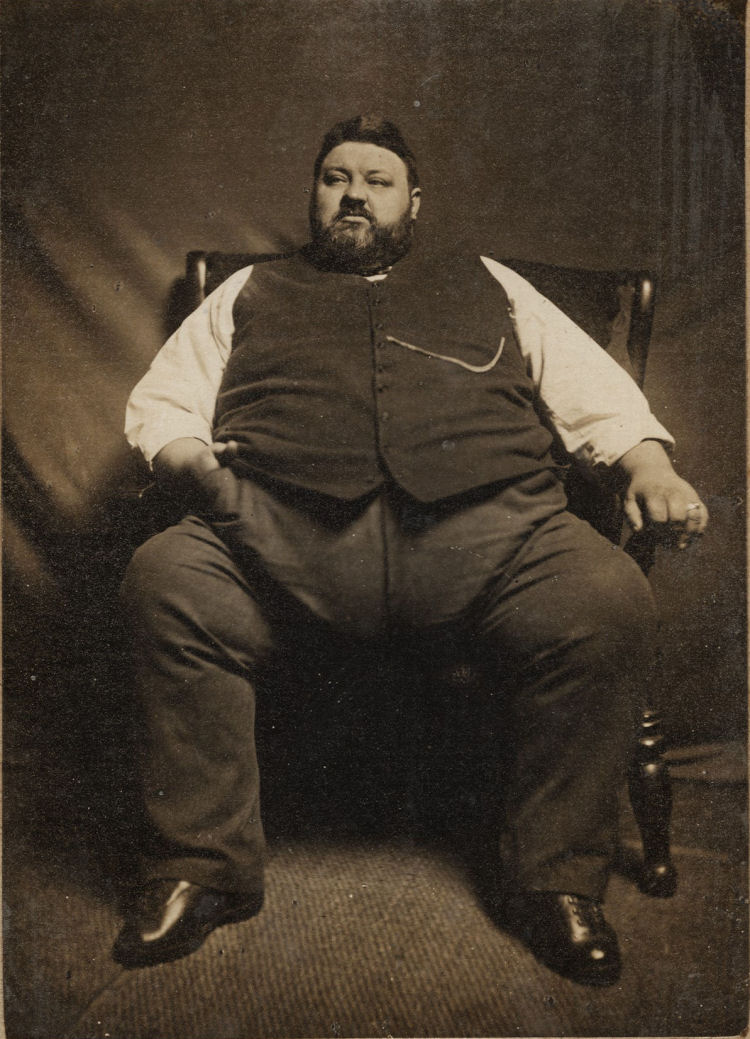 |
|
Above photo shows Thomas Longley, licensee of The Star
Inn for 30 years from 1874 to 1904 and one time heaviest man in England.
Photo by kind permission Dover Library.
|
|
From the Dover Express and East Kent News, Friday, 26 February, 1904. Price 1d.
DEATH OF Mr. T. LONGLEY
GREAT PUBLIC INTEREST IN THE FUNERAL
The death occurred on Monday at Dover, at the age of 56 years, of Mr.
Thomas Longley, a member of a very old and much respected Dover family.
His father was a butcher in Dover, and he was born in Snargate Street.
For many years Mr. Longley has been the landlord of the “Star Inn,”
Church Street, a quiet hostelry at the rear of St. Mary's Church. From
his youth he developed great size of body, more especially in the chest
measurement. As he grew older his size increased, and in course of time
he came to be regarded as the heaviest man in the Kingdom. His great
bulk doubtless caused him discomfort and inconvenience, nevertheless he,
until recent years, enjoyed good health. Visitors to the inn mentioned
the fact of his remarkable size to their friends, and he became in a way
somewhat of a curiosity, which could not have been pleasant to one who
was naturally of a retiring disposition. Of late years his portrait has
appeared in several London papers, and without much regard to his
feelings his weight, girth, and height were published and comparisons
made between him and other heavy men known in recent history. It is said
that his notoriety caused him to receive offers to go on “show,” but he
shrank from anything of the kind. Now that death has claimed our
townsman, it becomes a matter of history to record that he was beyond
question, previous to his illness, the heaviest man in the United
Kingdom, his weight being 46 stone, and his chest measurement 86in.
Owing to his bulk he did not look tall, but he was 6 feet 0¾ inches. For
thirteen years Mr. Longley had been confined to his house. The last time
he visited London he had to travel in the guard's van since it was found
impossible to pass his huge bulk through the doorway of an ordinary
carriage. Heavy as he was, Mr. Longley was 6¾ stone below the weight of
the bulkiest man of whom history has any record. Daniel Lambert. Some
idea of the great girth of this celebrity, who was born at Leicester in
1770, and died at Stamford in 1809, may be gathered from the fact that
his waistcoat, which is still preserved at the inn where he died, is
sufficient to enclose seven ordinary persons. Twenty years earlier than
Lambert there lived in Essex a grocer, who at the age of twenty-five,
weighed over 43st, but unlike Lambert, he refused to become a showman's
attraction, and so little is known of him. There is a well known case of
a girl of four years who weighed over 18st. In the popular mind Arthur
Orton is no less noted for his impudent claim to the estates than for
his corpulency. Contemporaries described him on his arrival in England
from Australia as gross, ponderous, and unwieldy. Compared with Lambert
however, he shrinks into insignificance. His weight at the time of the
first trial is given at slightly over 20st, though he is said to have
“put on flesh” subsequently at an alarming rate.
Apart from his so well being known, Mr. Longley will be very much missed
by the poor in the neighbourhood of his house. Whenever he heard of
anyone in distress he was always anxious to assist.
The funeral took place yesterday at St. Mary's Cemetery, Copt Hill,
where the grave was dug close to the Church. It was a seven feet deep
grave, and was eight feet long by three feet three inches. The service
was impressively conducted by the Rev. Prebendary A. L. Palmes, who came
over from Saltwood to add to his last tribute of respect to the memory
of an esteemed former parishioner. The immense size of the deceased gave
rise to rumour that it would be necessary to interfere with the
structure of the “Star Inn” to get the coffin out, but Messrs. Flashman
and Co., who undertook the funeral, found no need to do this, and the
coffin, which was 7ft long and 2ft 9in high, by 2ft 5in., was slid
through the window of the bar on to the hearse, which was drawn up close
to the window for that purpose. At the graveyard the bearers numbered
ten, and additional help had to be given in carrying the remains up the
slope. The funeral was timed to leave the house at 2 p.m. There was a
dense crowd round that “Star Inn” when the procession started, taking
the route Castle Street, Maison Dieu Road, Park Avenue, Salisbury Road
and Frith Road. The procession was followed by hundreds of people, while
thousands witnessed it en route. At the grave side there was probably
between two and three thousand people present, and in all probability
there was as much public attention given to the funeral as there was on
the occasion of that of the late Sir Richard Dickeson, and in the
addition to the general public, there were many who mourned the deceased
as a very good friend. There were many beautiful wreaths upon the coffin
from his immediate relatives and friends, whilst behind the procession
was a carriage filled with beautiful wreaths and floral devices from his
wider circle of friends. The chief mourners were: In the last carriage –
Messrs. Earnest Longley, E. Longley, W. Longley and Lutwytche. In the
2nd carriage – Messrs. Gates, W. Norman, R. Norman, and Wood. In the 3rd
carriage – Dr. Ormsby, Messrs. Emery and Carey. Other carriages
contained a large contingent of his fellow licensed victuallers and
well-known Dover people. In addition to the wreaths from the widow and
children of the deceased, his sisters and grandchildren, there were
wreaths from Sir William Crundall, Councillor H. W. Thorpe, Dr. Ormsby,
the Dover Licensed Victuallers Association, Mr. R. W. Philpott and
family. Mr. A. J. Emery and an old friend. Mr. and Mrs. Holbourne, Mr.
and Mrs. E. G. Holbourne. Mr. J. Relf, Mr. R. W. Pepper, “J. B.” Mr. and
Mrs. Norman, Mr. and Mrs. J. B. Friend, Mr. W. B. and W. S. Baker and
families, Mr. J. T. Gates and family, Mr. J. Crossier, Mr. Gillett, Mr.
G. F. Forster and family. Mrs. Hall and Chris, Mr. and Mrs. Knight and
family, Mr. and Mrs. Tart, Mr. and Mrs. Ernest Morgan, Mr. and Mrs. Fred
Adams, Mr. V. P. Kemp, Mrs. Knowles. Mr. J. Tabor, Mr. Frith, Mrs.
Brown, Mr. J. Ward, Mr. and Mrs. Corteel, Mr. and Mrs. B. T. Buss, Mr.
J. Evans, and Mr. E. Barrit. Mrs. F. Hicks and family, Mr. and Mrs. J.
G. Gates, Mr. and Mrs. Simmons, Mr. J. Crossier, Mr. Craig etc.
|
|
From the Dover Express and East Kent News, Friday, 5 September 1958.
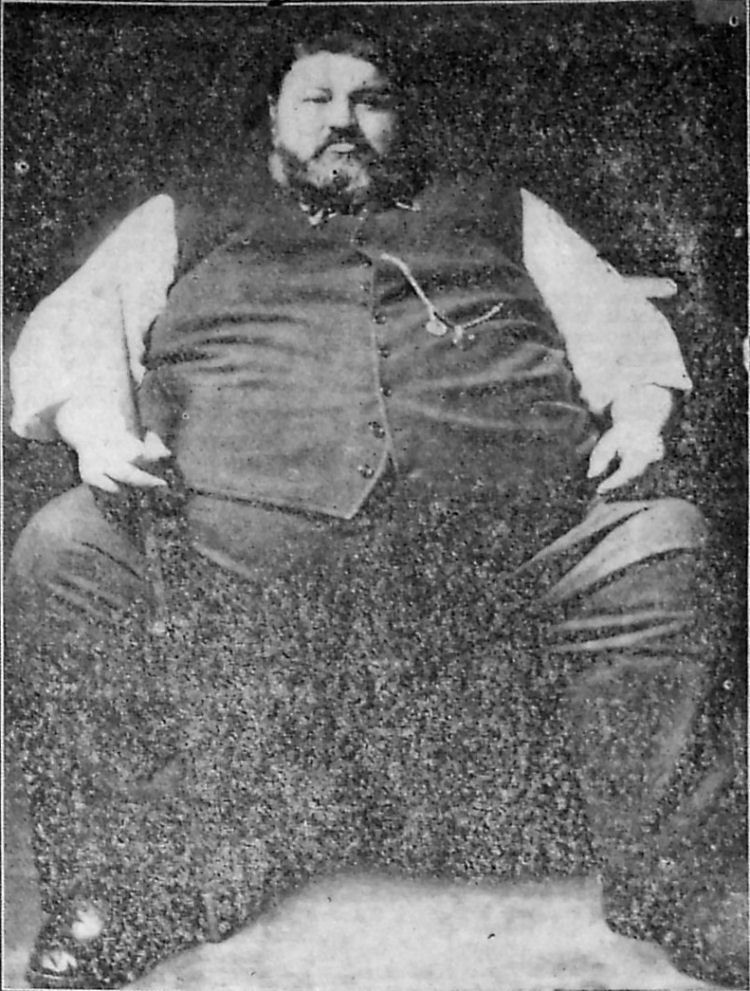
Few have not heard of Dover's heaviest man, Thomas Longley, who was
at one time landlord of the Star Inn, in Church Street. This photograph
has been lent to us by his son, Ernest, through his old school chum, Mr.
E. J. Parton, both who live in London.
Mr. Longley died in 1904, aged 56, Recorded under the photograph are
these particulars:- Weight 597lbs., height 6ft ¾in.,
chest 70ins., waist 85ins., calf of leg 26ins., and "The heaviest
British subject in the World."
|
Adjoining the "Star" Inn, for a good many years, were the joinery works
of Mr. G. T. Parks, a well known public man, who was a member of the town
council in 1869.
|
From the Dover Express and East Kent News, Friday 17
July, 1925. Price 1½d.
TWO DRUNK
At the Dover Police Court on Thursday, before Alderman W. J. Barnes
and J. W. Bussey.
William Richard Boddy, 3, Maxton Hill Cottages, motor garage
attendant, and Henry Andrew lane, 64, St. James's Street, a coster, were
charged with being drunk and disorderly in Church Street.
P.C. Turner said that 10.15 p.m. on Wednesday the defendants had been
ejected from the "Star," Church Street, and were shouting about union
wages and fighting. They were both drunk and refused to go away.
Fined 5s. each.
|
|
From the Dover Express and East Kent News, Friday, 19 August, 1932. Price 1½d.
RAID ON THE STAR INN
At the Dover Police Court on Friday, before Messrs. T. Francis, and W.
L. Law.
John Alfred Potts, “Star Inn,” Church Street, was summoned for supplying
intoxicating liquor during prohibited hours to Thomas Alfred Page, the
older, Thomas Alfred Page, the younger, and John Christopher Jordan, who
were also summoned fro consuming.
Mr. J. H. Mowll defended, and pleaded not guilty in all cases.
Mr. Loxton, who prosecuted, said that the police found the defendants on
the premises at 7.20 a.m. The defendant said that he did not know who
served the drinks or how they got there, and his wife said that had been
standing on the counter all night. This was a curious state of affairs
in an otherwise tidy bar, and further, the beer had froth on it and the
defendants' breath smelt of alcoholic liquor.
Police Sergeant Pay said: On July 16th, at 7.22 a.m., I went to the
“Star Inn” in consequence of information received, with P.C. Menpes. I
entered the private bar and I saw Mr. Pott standing behind the counter.
He looked at me, and immediately seized a pint glass of liquor that was
standing on the counter and commenced to hurry into the adjacent bar. I
called on him to stop, and he replaced it on the counter. In the public
bar defendant Jordan and the two Pages were seated. Opposite page junior
on the counter was the glass containing the dregs of port wine, and near
Jordan was the glass with liquor in it. A jug of water was beside it.
Page senior was seated in the corner of the public bar holding the glass
of whisky. I went to the public bar by the main door, and Page senior
gave me his glass, which I handed to P.C. Menpes. Mrs. Potts then came
behind the counter from a back room. Mr. Potts was obviously agitated.
The Magistrates' Clerk: And Mrs. Potts?
She was a bit, but not so bad as Mr. Potts.
Witness continuing, said: I asked defendant how he accounted for the
liquor in the glasses and the three men in the bar, and he said he did
not know. I then asked who the drinks belonged to, and he said he did
not know. I asked who served the drinks. Again he said he did not know.
Mrs. Potts then said that the glasses had been standing on the counter
all night and she had a glass of port wine before she went to bed the
night previous. I examined the glasses, and found the contents of
Jordan's glass to be ale, quite fresh and still had froth on the top.
The whisky appeared freshly poured out. The bar and behind the counter
was clean and tidy, and the glasses cleaned and stacked away behind the
counter. I replied to Mrs. Potts that page senior was actually holding a
glass of whisky in his hand. Neither made any reply to that. I asked
Jordan which was his drink, and he said he had not got one and only
entered the bar a few minutes before to talk over some business with Mr.
Page. I asked page junior which was his drink, and he repeated the same
words as Jordan. Both Jordan's and Page senior's breath smelt of
intoxicating liquor. I told Potts that the explanation was most
unsatisfactory and I should report them for offences under the Licensing
Act. I called Mr. Potts into a passage, and in the presence of P.C.
Menpes advised him not to serve them, and he said he would not. He then
said, “You are not obliged to take any notice of this, are you?” and I
said, “Of course I am.” He then said, “You are not obliged to take these
glasses, are you?” and he repeated that. I said, “ I shall borrow them,
as I may want them for evidence, but I will wrap them up in paper so
that no one can see.” The defendants left the house, and we left.
Cross-examined: A licensee could have beer at any time of the day he
liked. The only connection between the port wine and page junior was the
fact that it was opposite him on the counter. No explanation was given
by Page senior as to his reason fro being there.
Mr. Mowll: You have said that Mr. Potts was agitated, what about Page?
Perhaps it is as well if he did not tell you.
I am asking you.
Well, he was very cheeky. What I know of Mr. Page when he is sober he is
very polite, but when beery, the opposite, and he was opposite that
morning.
Further examined: He never saw Jordan with the glass near him. Mrs.
Potts did not say why they were in there.
Mr. Loxton: What was Page's physical condition? Well, ill, drunk, sober?
Very well, and apparently trying to take the rise out of me, to speak
vulgarly.
Did he show signs of suffering from the result of the consumption of
intoxicating liquor?
Only his talkativeness. I happen to know Page.
You cannot say anything different, but he appeared well and talkative?
Yes.
Further examined: In regard to the freshness of the beer, the bubbles
were still rising when they reached the Police Office.
P.C. Menpes corroborated. Page appeared in perfectly good health, but as
the Sergeant said, he was talkative.
Mr. Mowll submitted that there was no evidence against Jordan or Page
junior.
The Magistrates held that there was.
Mr. Mowll said that he did not think any useful purpose would be served
by calling evidence. It was a serious case for the publican, but the one
satisfactory feature was that there was no evidence of drunkenness. He
regretted that the Bench had not accepted his suggestion in regard to
two of the defendants, but his instructions were that the only person
who had alcoholic liquor was Page senior. He came to use the telephone
and brought some fish for Mrs. Potts. He complained of feeling unwell,
and she foolishly gave him some whisky. The man who had most to lose was
Potts, and it was for him that he pleaded. Next week he would have
completed 23 years in the “Star Inn” without a mark against him. He had
now been caught, but in view of his long record he asked the magistrates
to deal with him as leniently as they could.
The Chairman said that as regard Potts, he would be fined £5 and two
guineas costs, and taking into consideration the long time he had held
the licence, they hoped and felt confident the Police would not proceed
further as regards opposing the renewal of the licence. Jordan and the
two Pages, would each be fine £1.
Chief Constable Bond said that as long as the defendant kept his licence
clean between now and the next Sessions he would not oppose the renewal.
|
George Beer and Rigden were threatened with redundancy here in 1933 but
managed to evade the axe.
|
Dover Express, Friday 10 February 1933.
Dover Brewster sessions.
The next house to be considered was that of the "Star Inn," Church Street.
Mr. R. Mowll appeared for the owners, Messrs. George Beer and Rigden, and
asked for its renewal, as also did the licensee, Mr. G. H. Woods.
Inspector Leeming gave evidence as to 10 visits to the premises, a total of
23 customers being present. The present licensee had been there since
January 6th, and the one prior to him for 25 years.
Mr. Mowll:- You know that beside the previous landlord being there for over
20 years, before that the celebrated Mr. Tommy Longley was there, and his
name, and his girth, and his particular house with famous almost throughout
the British Empire?
Yes.
Mr. W. J. Jennings, chairman of Messrs. George Beer and Rigden, said that he
had known the house for 40 years, and they had been only two changes in
about 50 years. When Mr. Longley went, Mr. Potts followed. When the last
tenant got into trouble the Magistrates expressed the opinion that it should
not interfere with the continuity of the licence, but they did not like the
idea of a man who have broken the law being in one of their houses, and they
gave him notice to leave. The new landlord, Mr. Woods, on the valuation made
himself responsible for £291. The trade was not quite as good as it was, but
the house had always done a good trade, and he had no doubts that when Dover
and the country began to look up again it would again do the trade. He
handed in particulars as to the trade done. This shows that it had dropped
from 235 barrels in 1926 to 119 in 1932. There was, however, an increase in
spirits.
The Magistrates, after some discussion, voted by means of a sheet of paper,
and the announcement was made that both houses ("Criterion") would be referred.
|
It was closed during world war two on 4 October 1940 and did not reopen.
|
Dover Express 6th September 1946.
The engagement is announced of Gwendoline Joyce (Bubbles) Sidwell, only child of Major and
Mrs. F. Sidwell of the “Queen Victoria”, Cheam, Surrey, and late of the
“Star” Inn, Dover, to Ronald, eldest son of Capt. and Mrs. F. Gibbs of
Cheam, Surrey. |
The demolition of that side of the street commenced in March 1950 and
this was taken down in October 1951 under a compulsory purchase order. For
the "Star Inn" and 24 Church Street, Dover Corporation authorised a payment
of £2,618 in May 1952.
|
From the Dover Express, 24 August 1951.

INN WITH FAMOUS LANDLORD
Demolition of the Star Inn, in Church Street, now in
progress, recalls the fact that for many years its landlord was Thomas
Longley, one of the heaviest men who ever lived in England. Born in
Snargate Street, Dover, the son of a butcher, he died in February, 1904,
at the age of 56. He weighed 46 stone, and had a chest measurement of
86 inches. Being unable to get into a railway carriage he travelled in
the guards van.
|
Another with this title once traded from Round Tower Street.
CULLEN William 1826-39+
  
FRY Edward 1837-51
(age 42 in 1851 ) )
 
FRY Mary Ann 1841-58+

YONWIN Mr 1859+
ELLENDER R 1862-Mar/64
 
CLARK Mr George Jan/1865+

KEELER Thomas 1868-Apr/73 dec'd (age 38 in 1871 ) )

KEELER Mrs Mary Apr/1873+ (age 36 in 1873)

DELLER Thomas 1878
 (13 Church Street)
(13 Church Street)
LONGLEY Thomas May/1873+
 (moved to Kennington by 1879)
(moved to Kennington by 1879)
DANNENBERG Otto 1881+ (publican age 43 in 1881 not naturalised not naturalised ) )
LONGLEY Thomas Feb/1904 dec'd (age 53 in 1901 ) )      
LONGLEY Mrs Helen Feb/1904+

POTTS John Alfred 1907-Dec/32 (age 40 in 1911 ) )
     
MARTIN Wilfred Dec/1932-Jan/33
 (Secretary to Messrs. George Beer & Rigden)
(Secretary to Messrs. George Beer & Rigden)
 WOODS George Henry Jan/1933-June/34
WOODS George Henry Jan/1933-June/34

MARTIN Wilfred June/1934+ (Secretary to
Messrs. George Beer & Rigden)
MARSH W A 1935
MARTIN Wilfred to Oct/1937
 (Secretary to
Messrs. George Beer & Rigden) (Secretary to
Messrs. George Beer & Rigden)
SIDWELL George Frank Oct/1937-Dec/39
   (21 years in the Royal East Kent Regiment.)
(21 years in the Royal East Kent Regiment.)
 MALTBY Reginald Harry Dec/1939+
MALTBY Reginald Harry Dec/1939+


The Dover Express reported Reginald Harry Maltby, late of the “Five
Alls” Inn Market St., Dover; wine, spirits and beer (off), (8 Dec 1939).
Perhaps he was only here for a month.
 From the Pigot's Directory 1828-9 From the Pigot's Directory 1828-9
 From the Pigot's Directory 1832-33-34 From the Pigot's Directory 1832-33-34
 From the Pigot's Directory 1839 From the Pigot's Directory 1839
 From the Pigot's Directory 1840 From the Pigot's Directory 1840
 From Melville's Directory 1858 From Melville's Directory 1858
 From the Post Office Directory 1862 From the Post Office Directory 1862
 From the Post Office Directory 1874 From the Post Office Directory 1874
 From the Post Office Directory 1878 From the Post Office Directory 1878
 From the Post Office Directory 1891 From the Post Office Directory 1891
 From Pikes Dover Blue Book 1895 From Pikes Dover Blue Book 1895
 From the Kelly's Directory 1899 From the Kelly's Directory 1899
 From the Post Office Directory 1901 From the Post Office Directory 1901
 From the Post Office Directory 1903 From the Post Office Directory 1903
 From the Kelly's Directory 1903 From the Kelly's Directory 1903
 From the Post Office Directory 1913 From the Post Office Directory 1913
 From the Post Office Directory 1918 From the Post Office Directory 1918
 From the Post Office Directory 1922 From the Post Office Directory 1922
 From Pikes Dover Blue Book 1924 From Pikes Dover Blue Book 1924
 From the Post Office Directory 1930 From the Post Office Directory 1930
 From Pikes Dover Blue Book 1932-33 From Pikes Dover Blue Book 1932-33
 From the Post Office Directory 1938 From the Post Office Directory 1938
 From Pikes Dover Blue Book 1938-39 From Pikes Dover Blue Book 1938-39
 From the Dover Express From the Dover Express
 From the Dover Telegraph From the Dover Telegraph
 Census Census
|









